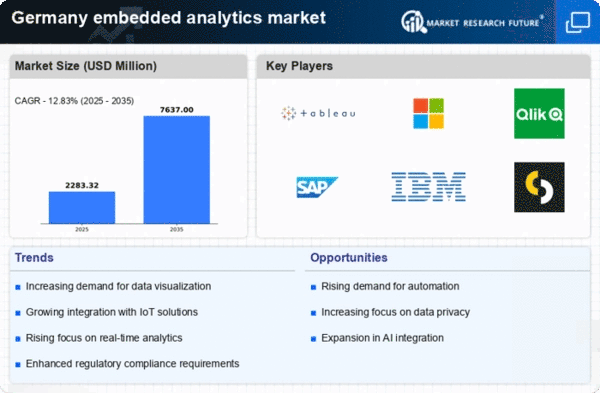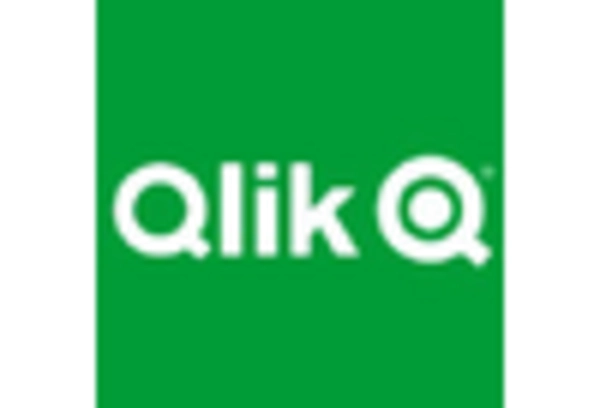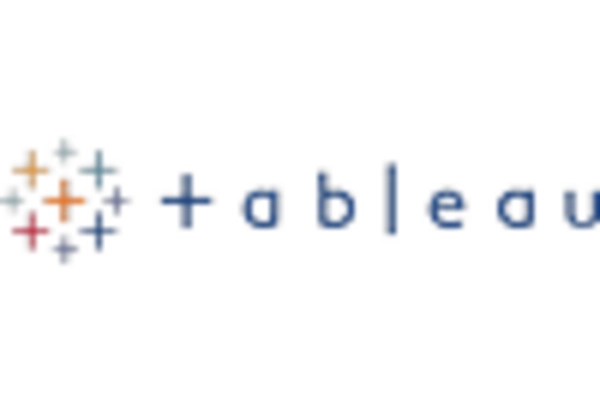Growing Emphasis on Data-Driven Culture
the embedded analytics market in Germany is greatly impacted by the growing emphasis on fostering a data-driven culture within organizations.. Companies are increasingly investing in training and resources to empower employees at all levels to utilize data effectively in their decision-making processes. This cultural shift is supported by the recognition that data-driven insights can lead to improved performance and innovation. Recent surveys suggest that approximately 70% of German businesses are prioritizing data literacy initiatives, which in turn drives the demand for embedded analytics solutions. As organizations strive to democratize data access and enhance analytical capabilities, the embedded analytics market is likely to see a corresponding increase in adoption rates. This trend reflects a broader movement towards integrating analytics into everyday business practices, thereby enhancing overall organizational effectiveness.
Rising Demand for Real-Time Data Insights
the embedded analytics market in Germany is experiencing a significant increase in demand for real-time data insights.. Organizations are increasingly recognizing the value of immediate access to analytics, which enables them to make informed decisions swiftly. This trend is particularly evident in sectors such as finance and retail, where timely data can significantly impact operational efficiency and customer satisfaction. According to recent estimates, the market for embedded analytics solutions is projected to grow at a CAGR of approximately 15% over the next five years. This growth is driven by the need for businesses to leverage data effectively, thereby enhancing their competitive edge in a rapidly evolving marketplace. As companies continue to integrate analytics into their workflows, the embedded analytics market is likely to expand further, reflecting a broader shift towards data-driven decision-making in Germany.
Increased Adoption of Cloud-Based Solutions
The shift towards cloud-based solutions is a pivotal driver for the embedded analytics market in Germany. As organizations seek to enhance their operational flexibility and reduce infrastructure costs, cloud-based analytics platforms are becoming increasingly attractive. This transition allows businesses to access powerful analytics tools without the need for extensive on-premises hardware. Recent data indicates that the adoption of cloud services in Germany has risen by over 30% in the past two years, with many companies prioritizing cloud-based analytics for their scalability and ease of integration. The embedded analytics market is poised to benefit from this trend, as more organizations recognize the advantages of cloud solutions in facilitating real-time data analysis and collaboration across teams. Consequently, the market is expected to witness substantial growth as businesses continue to migrate to cloud environments.
Regulatory Compliance and Data Security Needs
The embedded analytics market in Germany is also shaped by the increasing focus on regulatory compliance and data security. With stringent regulations such as the General Data Protection Regulation (GDPR) in place, organizations are compelled to ensure that their analytics practices adhere to legal standards. This necessity drives the demand for embedded analytics solutions that offer robust security features and compliance capabilities. Recent reports indicate that nearly 60% of German companies consider compliance a top priority when selecting analytics tools. As businesses seek to mitigate risks associated with data breaches and non-compliance, the embedded analytics market is likely to expand, with vendors offering solutions that address these critical concerns. This focus on security and compliance not only protects organizations but also builds trust with customers, further enhancing the market's growth potential.
Technological Advancements in Analytics Tools
Technological advancements are playing a crucial role in shaping the embedded analytics market in Germany. Innovations in artificial intelligence (AI) and machine learning (ML) are enhancing the capabilities of analytics tools, enabling more sophisticated data analysis and visualization. These advancements allow organizations to derive deeper insights from their data, facilitating better decision-making processes. Recent studies indicate that the integration of AI and ML in analytics solutions is expected to increase by over 25% in the coming years. As businesses seek to leverage these technologies to gain a competitive advantage, the demand for advanced embedded analytics solutions is likely to rise. This trend reflects a broader movement towards harnessing cutting-edge technology to improve analytical capabilities, thereby driving growth in the embedded analytics market.
















